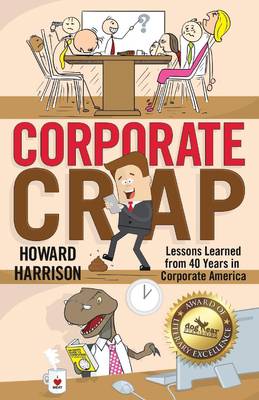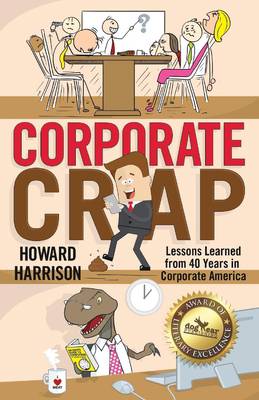
Bedankt voor het vertrouwen het afgelopen jaar! Om jou te bedanken bieden we GRATIS verzending (in België) aan op alles gedurende de hele maand januari.
- Afhalen na 1 uur in een winkel met voorraad
- Gratis thuislevering in België vanaf € 30
- Ruim aanbod met 7 miljoen producten
Bedankt voor het vertrouwen het afgelopen jaar! Om jou te bedanken bieden we GRATIS verzending (in België) aan op alles gedurende de hele maand januari.
- Afhalen na 1 uur in een winkel met voorraad
- Gratis thuislevering in België vanaf € 30
- Ruim aanbod met 7 miljoen producten
Zoeken
Corporate Crap: Lessons Learned from 40 Years in Corporate America
Howard Harrison
Paperback | Engels
€ 22,45
+ 44 punten
Omschrijving
Corporate Crap: Lessons Learned from 40 Years in Corporate America takes a humorous look at all the business practices that cause employees to look for new employment. There are the obvious things like meetings, performance reviews, downsizing, and bosses from hell. But it's also esteem-sapping exercises like competing for wall offices or asking if it's okay to leave early; dress codes, task forces, brainstorming and engagement surveys; flip charts, org charts, hard stops, and hard-ons. Each chapter of Corporate Crap combines personal anecdotes, quotes from business experts, and the latest research to answer the question: If companies truly believe employees are their most valuable resource, why do they treat them like crap? Corporate Crap will entertain and inform anyone who has ever worked for a large organization - and make you think twice next time you apply for a job!
In Corporate Crap, readers will learn:
-How companies are trying to shorten meetings by making everyone stand and other forms of torture.
-Why the founder of Second City Works calls Tina Fey "a genius boss."
-How the author burned his first professional bridge in his first-ever exit interview.
-Why 700 million vacation days went unused last year. (What is wrong with you people?)
-The roots of "at the end of the day" and other common expressions.
-Why companies don't call employees "employees" anymore - and how it can backfire on them.
-How hiring managers are affected by stereotypes - and not always how you'd think.
-Companies' obsession with labeling employees as introverts or extroverts and why it is a complete waste of time.
-The biggest problem companies have firing people.
-Why the idea that "no idea is a bad idea" is a bad idea.
-What people really do during conference calls.
If you're looking for a serious examination of workplace issues, Harvard Business Review may be a better source. But there is still an important message here. Companies invest enormous resources to improve their "corporate cultures," yet employees are as cynical and unengaged as ever. There are lessons to be learned here - lessons learned from 40 years of Corporate Crap. Enjoy.
In Corporate Crap, readers will learn:
-How companies are trying to shorten meetings by making everyone stand and other forms of torture.
-Why the founder of Second City Works calls Tina Fey "a genius boss."
-How the author burned his first professional bridge in his first-ever exit interview.
-Why 700 million vacation days went unused last year. (What is wrong with you people?)
-The roots of "at the end of the day" and other common expressions.
-Why companies don't call employees "employees" anymore - and how it can backfire on them.
-How hiring managers are affected by stereotypes - and not always how you'd think.
-Companies' obsession with labeling employees as introverts or extroverts and why it is a complete waste of time.
-The biggest problem companies have firing people.
-Why the idea that "no idea is a bad idea" is a bad idea.
-What people really do during conference calls.
If you're looking for a serious examination of workplace issues, Harvard Business Review may be a better source. But there is still an important message here. Companies invest enormous resources to improve their "corporate cultures," yet employees are as cynical and unengaged as ever. There are lessons to be learned here - lessons learned from 40 years of Corporate Crap. Enjoy.
Specificaties
Betrokkenen
- Auteur(s):
- Uitgeverij:
Inhoud
- Aantal bladzijden:
- 120
- Taal:
- Engels
Eigenschappen
- Productcode (EAN):
- 9781098326418
- Verschijningsdatum:
- 16/11/2020
- Uitvoering:
- Paperback
- Formaat:
- Trade paperback (VS)
- Afmetingen:
- 137 mm x 213 mm
- Gewicht:
- 399 g

Alleen bij Standaard Boekhandel
+ 44 punten op je klantenkaart van Standaard Boekhandel
Beoordelingen
We publiceren alleen reviews die voldoen aan de voorwaarden voor reviews. Bekijk onze voorwaarden voor reviews.









